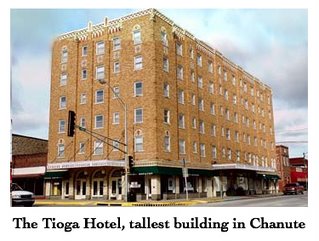Wednesday, December 20, 2006 at 1:34 PM
Posted by Dan Webb, Software Engineer, Google Earth for Mac OS XIf you're in the U.S. and you have a Mac, try this: Launch Google Earth, wait for the zooming to stop, and then press the + button to zoom closer. You'll arrive at the small town of Chanute, Kansas, nestled in the southeast corner of the state. I doubt you've ever noticed this before now. But even if you have, you're probably wondering -- why Chanute?
There are several reasons. The most important reason is that I was born and raised there. I grew up on a small farm, and while everyone else was out feeding the ducks and milking the cows, I was inside making electronic contraptions and eventually programming computers (which would scarcely be recognized as such today, since my first computer had only 256 bytes of memory and a dual hexadecimal LED display).

The second reason I chose Chanute is that it's near the geographic center of the 48 contiguous states. If I had been born in, say, New Hampshire, I never would have thought to tamper with the Google Earth coordinates.
And the last reason is that my co-worker Brian McClendon, who grew up in Lawrence, Kansas, had already positioned the Windows version of Google Earth (which shipped a few months earlier than the Mac version) at his hometown. I guess you could say that Brian's shenanigans inspired my own.
But the choice of Chanute is not without controversy. Because it's farther than Lawrence from the geographic center of the 48 states, and since (as of this writing) the satellite imagery at Chanute is not as crisp, it could be interpreted as a less user-friendly choice, which is not in keeping with the Macintosh tradition. But don't let that fool you -- the people in Chanute are as friendly as they come. Stop by sometime and say hello -- and be sure to tell them Dan sent you.



